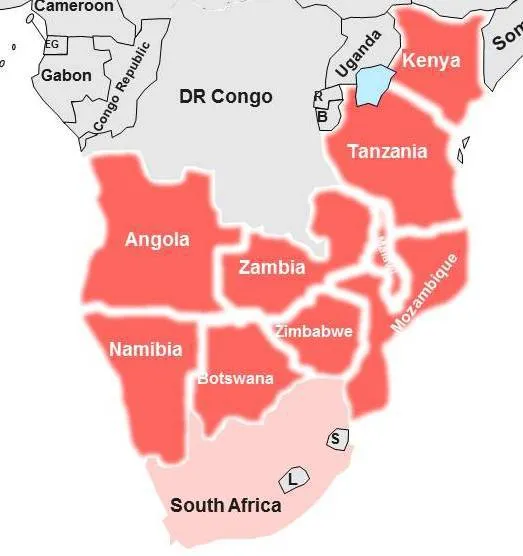Keeping You Safe On Safari: Travel Health Tips
We often get asked about special health precautions and whether there are vaccinations you need to get before you travel to Southern and East Africa on safari. With most travel advice, a little common sense and advanced preparation go a long way.
Updated on 4 February 2025
Vaccinations: Do You Need Them for Your Safari?
If you are fit and healthy with no underlying medical conditions, there are no compulsory vaccinations necessary for visiting most of the top safari destinations in Africa. The main exception is Yellow Fever.
Yellow Fever Requirements
It is always advisable to check with your GP or local travel clinic for the most up-to-date health recommendations before embarking on your safari. Below are details regarding Yellow Fever vaccination requirements.
Countries requiring proof of Yellow Fever vaccination for entry:

Proof of vaccination
- Angola
- Benin, Burkina Faso, Burundi
- Cameroon, Central African Republic, Cote d’Ivoire
- DR Congo
- Equatorial Guinea
- French Guiana
- Gabon, Ghana, Guinea-Bissau
- Liberia
- Mali, Mauritania
- Niger
- Republic of Congo
- Sierra Leone, South Sudan
- Togo
Countries requiring proof of vaccination if arriving from a Yellow Fever region:
- Botswana
- Cape Verde, Chad
- Egypt, Eswatini, Ethiopia
- Gambia, Guinea
- Kenya
- Madagascar, Malawi, Mayotte, Mozambique
- Namibia
- Nigeria
- Rwanda
- Senegal, Seychelles, Somalia, South Africa, Sudan
- Tanzania
- Uganda
- Zambia, Zimbabwe
Ensuring Your Health and Safety
The safari lodges and itineraries we recommend prioritise your health and safety. We have personally visited most of the lodges and camps we sell and pay careful attention beyond just service levels and comfort. We assess whether the lodges and camps are run by reliable managers and trustworthy staff and consider logistics such as emergency response and access to medical care. Food preparation, drinking water, and general facilities meet high standards, minimising any risks. Additionally, most remote lodges have evacuation plans in place for health emergencies.
Additional Vaccinations
We would not put an itinerary together that includes visits to locations with less-than-optimal health and sanitary conditions. However, if you choose to book this leg of your trip independently, we strongly advise consulting your health professional for personalised advice regarding any necessary vaccinations.
Malaria: The Greatest Health Risk in Africa
Malaria remains a prevalent concern in many parts of Africa. However, the risk can be effectively managed with precautionary measures:
- Avoid being bitten: Use insect repellents, wear long-sleeved clothing in the evenings, and sleep under mosquito nets.
- Stay informed about the season: Malaria is more common during the wet season, while the dry season—ideal for game viewing—poses a lower risk.
- Preventative medication: Discuss malaria prophylaxis options with your doctor well in advance of your trip.
Most safari lodges provide mosquito nets, air conditioning, and ceiling fans to reduce the likelihood of bites. Malaria-carrying mosquitoes rely on human hosts to complete their life cycle, which is why they are more common in densely populated areas and during the rainy season. However, in remote safari regions, where human populations are sparse, the risk of malaria is significantly lower.

Malaria Map Southern/East Africa
With the right precautions—such as using insect repellent, wearing long-sleeved clothing in the evenings, and taking prophylactic medication if advised—malaria is both preventable and treatable, ensuring you can enjoy your safari with peace of mind. For more detailed tips on staying safe, check out our blog on the best ways to prevent malaria.
Recognising Malaria Symptoms
Be aware of flu-like symptoms seven to 18 days after visiting a malaria-prone area. Seek immediate medical attention and inform healthcare providers of your travel history to ensure timely treatment. Malaria is treatable if detected early, especially for individuals who are healthy and not immunocompromised. The reason why malaria statistics in Africa are high is due to the prevalence of vulnerable groups (children under five, pregnant women, and those with weakened immune systems) lacking access to healthcare.
Other Travel Health Tips
- Stay hydrated: Dehydration is a common concern during hot safari days. Drink plenty of bottled or purified water.
- Pack a travel health kit: Include essentials such as pain relievers, antihistamines, antidiarrheal medication, and hand sanitizers.
- Be sun smart: Use high-SPF sunscreen, wear a wide-brimmed hat, and bring UV-protective sunglasses.
- Travel insurance: Ensure your policy covers medical evacuation and treatment in remote areas.
Latest Travel Health Alerts
Being informed is your best protection. Some trusted resources for the latest travel health advice include:
Final Thoughts
A safari is an incredible adventure, and with the right precautions, you can enjoy it safely and comfortably. Consult with health professionals, stay informed, and prepare well to make your safari a memorable experience for all the right reasons.
You may also want to look at

The Best Way to Prevent Malaria on Safari: How to Avoid Mosquito Bites
Planning a safari in a malaria-risk area? While malaria is a serious but preventable disease, the risk for travellers is low with the right precautions. This blog covers the best ways to prevent mosquito bites—your first line of defence against malaria—so you can enjoy your safari with confidence.

Magical Madikwe - much more than just malaria-free
Madikwe Game Reserve in South Africa's North-West Province has several surprises in store. It's one of the best conservation areas in Africa. It's a Big 5 reserve. It's malaria-free. And it has a whole lot more to offer ...

Is it safe to travel to South Africa?
This remains one of the most common questions from people wanting to do an African safari. How safe is it really to travel to South Africa? We take a hard and honest look at this important question. Updated in August 2023.
About the author

A 'word smith' or copywriter with over 25 years experience, love travelling, wildlife and conservation; fascinated by alternative energy, alternative building and alternative health. Consummate reader and traveller, both internationally and southern Africa. Have two remarkable daughters that continue to amaze and teach me daily. Consider myself privileged to live on the best continent on the planet.









